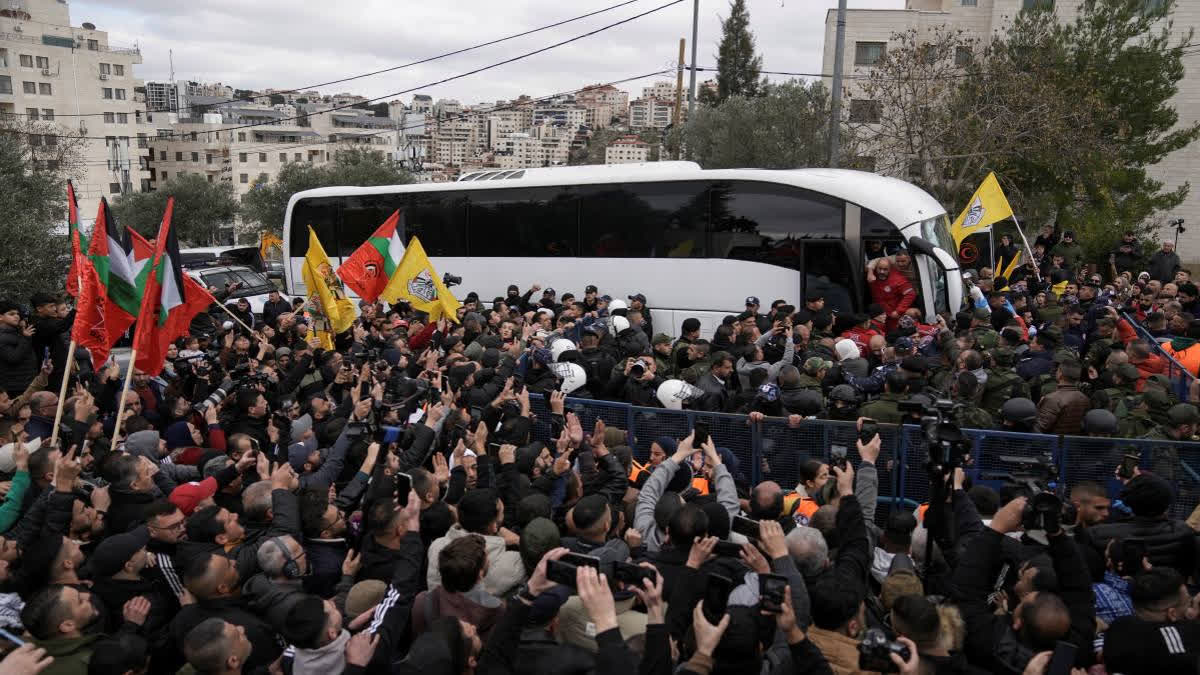Ramallah:Israel released 183 Palestinian prisoners on Saturday in the latest exchange for Israeli hostages held in Gaza, part of a ceasefire that has paused the war but whose future is uncertain. Israel views the security prisoners as terrorists, while Palestinians see them as freedom fighters resisting a decades-long military occupation.
Nearly every Palestinian has a friend or family member who has been jailed by Israel at some point, for militant attacks or lesser offenses like rock-throwing, protesting or membership in a banned political group. Some are held for months or years without trial in what is known as administrative detention, which Israel says is needed to prevent attacks and avoid sharing sensitive intelligence.
Eighteen of those released Saturday had been sentenced to life and 54 were serving long sentences for their involvement in deadly attacks against Israelis. Seven of those convicted of the most serious crimes will be transferred to Egypt ahead of further deportation.
Among those being released are 111 Palestinians who were rounded up after Hamas' Oct. 7, 2023, attack on southern Israel, which triggered the war. They had been detained without trial.
Here's a look at some prominent Palestinian prisoners released since the truce went into effect on Jan. 19.
Iyad Abu Shakhdam
Abu Shakhdam, 49, was sentenced to the equivalent of 18 life sentences over his involvement in Hamas attacks that killed dozens of Israelis during the second intifada, or Palestinian uprising, between 2000 and 2005.
Among the most infamous of those attacks was a double suicide bombing that blew up two buses in the southern Israeli city of Beersheba in 2004, killing 16 Israelis, including a 4-year-old, and wounding over 100 others. In interviews with Arabic media, he described his militancy as a desire for revenge stemming from his brother's killing by Israeli security forces in 2000.
Abu Shakhdam was on the run for weeks before his arrest in his hometown of Hebron in the West Bank in November 2004, following a gunfight with Israeli security forces in which he was shot 10 times.
During 21 years in prison, his family said, he finished high school and earned a certificate for courses in psychology.
Jamal al-Tawil
Al-Tawil, 61, a prominent Hamas politician in the occupied West Bank, has spent nearly two decades in and out of Israeli prison, in part over allegations that he helped plot suicide bombings.
Most recently, the Israeli military arrested al-Tawil 2021, saying that he had participated in violent riots and mobilized Hamas political activists in Ramallah, the seat of the semi-autonomous Palestinian Authority and Hamas' main rival.
He had been held without charge or trial since then. After his arrest, he went on hunger strike for more than three weeks to protest his administrative detention.
During one of al-Tawil's stints in Israeli prison in the early 2000s, he ran a successful electoral campaign from custody to become mayor of Al-Bireh, a West Bank town abutting Ramallah.
U.S. court documents from 2007, filed by the families of Israelis killed during the second intifada, show that al-Tawil had served for years as chairman of Al-Islah Charitable Society, a front organization to raise money for Hamas. The case accused al-Tawil of recruiting a Hamas militant to carry out a 2001 suicide bombing that targeted a crowded pedestrian mall in Jerusalem, killing 11 people.
His daughter, 32-year-old journalist Bushra al-Tawil, was among the dozens of women and teenagers released in the first round of prisoner-for-hostage exchanges on Jan. 19.
He was among at least seven Palestinian prisoners who were immediately taken to a hospital after their release on Saturday.
Mohammed el-Halabi
The Palestinian manager of the Gaza branch of World Vision, a major Christian aid organization, was arrested in 2016 and accused of diverting tens of millions of dollars to Hamas in a high-profile case that drew criticism from rights groups. He was freed on Feb. 1.
Both el-Halabi, 47, and World Vision vigorously denied the allegations and independent investigations found no proof of wrongdoing. One independent audit found that el-Halabi had enforced internal controls and ordered employees to avoid anyone suspected of Hamas ties.
Rights groups say el-Halabi was denied a fair and transparent trial, as he and World Vision had no chance to review the evidence against them. U.N. experts say el-Halabi was questioned for 50 days without access to a lawyer. He was sentenced to 12 years in prison.
Israel has attributed the closed hearings to sensitive security information being relayed.
Shadi Amouri
